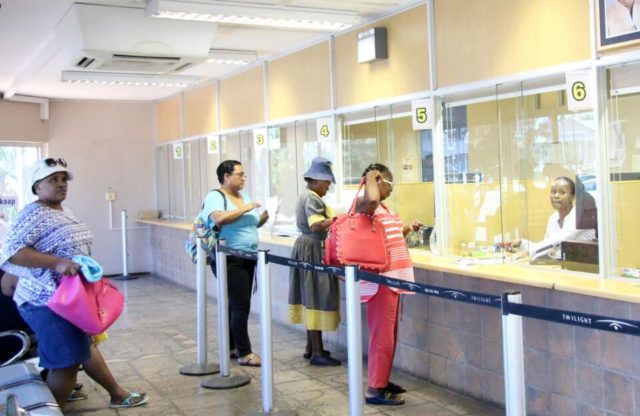Warning lights are flashing for city residents and businesses who are facing a power blackout as Sol Plaatje Municipality is struggling to pay its debts exceeding R569.3 million.
WARNING lights are flashing for city residents and businesses who are facing a power blackout as Sol Plaatje Municipality is struggling to pay its debts exceeding R569.3 million.
The biggest outstanding accounts, as of December 31, 2021, are for Eskom, which the local authority owes R434.7 million, and the Water Board, which is owed R102.3 million.
Due to cash-flow constraints, the municipality has not been able to settle its current accounts within the prescribed 30-day period, where its accounts are overdue for more than 90 days.
According to a financial viability and sustainability report for the period June-December 2021, the interest charged on these overdue accounts for electricity and water alone amounted to R34.4 million for the 2019/20 and 2020/21 financial years.
The report stated that these charges were considered to be fruitless and wasteful expenditure, where 85 percent of debt was older than 90 days.
“The amount of long outstanding debtors is increasing monthly. This trend is alarming and indicates a material risk to the sustainability of the municipality,” the report states.
Total debts as of December 31, 2021 amounting to R2,7 billion were identified as posing a serious threat to the sustainability and viability of the municipality.
“Serious intervention is of critical importance to restore financial stability to the organisation.”
The report also stated that the municipality has been unable to reduce electricity and water losses consistently since the 2016/17 financial period.
Electricity losses as of June 30, 2021 stood at 29.59 percent, while water losses increased to 64.82 percent.
Fruitless and wasteful expenditure to the amount of R15.5 million was reported with regards to interest charges on arrear amounts owed by Sol Plaatje Municipality to Eskom during an audit that was conducted in 2019/20 and 2020/21.
It was indicated that the inability to pay Eskom could result in a blackout or expropriation of the municipality’s assets.
“The estimated cash shortfall for the period June to December 2021 indicates that the municipality is not collecting enough revenue to cover its commitments, where monthly expenses amount to roughly R157 million while the average cash collection comes to R118 million. This results in an average estimated monthly shortfall of R38.9 million.”
It was reported that the shortfall for June until August was higher due to the higher billing period for Eskom and the additional loan repayment of R16, 5 million that was due at the end of June 2021.
“December is higher due to the bi-annual loan repayment and employee bonuses that were paid.
“As at December 31, 2021, the municipality had R66.5 million of unsecured funds available, while total creditors amounted to R569.3 million. The municipality is therefore unable to pay creditors as and when they are due. The largest outstanding creditors are Eskom and the Water Board.
“Sol Plaatje Municipality tries their level best to pay all outstanding creditors within 30 days. Therefore the huge creditor amounts outstanding relates to Eskom and the Water Board.”
The report stressed that the municipality required R558.2 million in additional unsecured funds after all liabilities have been paid to be considered financially viable.
“The financial ratios clearly indicate that the municipality is experiencing serious financial difficulty as most of the liquidity, sustainability and debtor’s management ratios are well below the norm. The municipality’s current ratio is, however, still above the norm, indicating that the municipality is still solvent. This is, however, due to the high levels of outstanding debtors and if the debtor’s collection does not improve it will not be sustainable in the long term.”
The report identified high levels of distribution losses and a creditor payment period of 140 days.
“The legislative maximum number of creditor payment days is 30 days. This clearly indicates the municipality’s inability to pay creditors when due.”
The report found it “extremely alarming” that the net operating deficit with electricity services was the highest, at 12 percent, followed by water deficits of nine percent and sanitation deficits of six percent.
“The municipality cannot remain financially sustainable while realising operating deficits for these revenue generating sources.”
Remuneration of employees and councillors amounts to R756.4 million.
According to council records, Sol Plaatje Municipality applied for electricity tariff increases to the National Energy Regulator of South Africa (Nersa) while the Department of Mineral Resources and Energy had at the same time issued electricity pricing policy regulations regulating the price structure for electricity.
It was stated that this resulted in the “splitting” of the existing tariff, which resulted in the municipality not implementing the Nersa approved increase for the 2018/19 financial year.
The non-implementation of the tariffs that were approved led to management presenting a cost-containment plan to avert the implications of this decision.
This led to a loss of revenue to the amount of R106 million in the 2018/19 financial year.
“These losses carried to date and, as at June 30, 2021, the estimated total losses in electricity sales revenue amounts to R350 million.
“Due to losses in revenue as a result of tariff approved and tariff implemented the municipality has since been unable to meet its obligation to pay Eskom. As of June 30, 2021, the municipality owes Eskom in the region of R350 million and continues to grow. This debt resulted in penalties and interest imposed by Eskom which resulted in fruitless and wasteful expenditure.”








